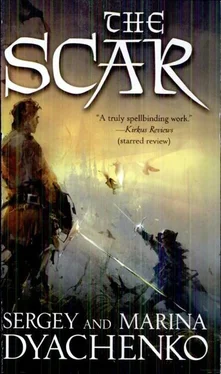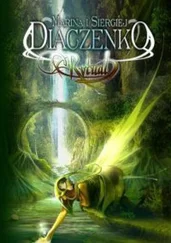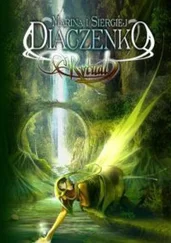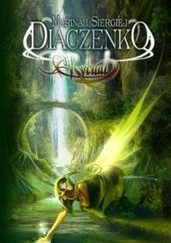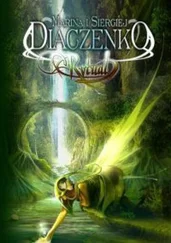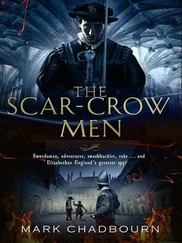“Just a minute,” muttered Karver.
They all looked at him in surprise.
“Just a minute,” he repeated, louder this time. “Dron, and you, gentlemen—in your opinion, did Lieutenant Soll behave correctly?”
One of them snorted, “What is this nonsense, what are you doing, talking like this about your superior, asking if it was correct or incorrect? If he had acted, this dolt wouldn’t be alive.”
“It would have been improper, had he brutalized the lad,” remarked Dron in a conciliatory manner. “That’s enough, Karver, let it go.”
Then something odd happened. Slipping between the guards, Karver suddenly appeared right in that same spot where the now prostrate tailor had stood before. Bending his knees slightly, Karver struck the puddle with his boot.
It became as quiet as a long-forgotten tomb. A convulsion passed through Egert’s body as fresh grime adhered to his coat, slicking his scarred cheek with new drops and cementing his blond hair into icy tufts.
“But!” one of the guards said stupidly. “Uh, but what…”
“Egert,” Karver asked quietly, “are you just going to stand there?”
His voice seemed at once very near and very far away: it was as if Egert’s ears were stuffed with cotton.
“He is just going to stand there, gentlemen,” Karver promised just as quietly, and once again he doused Egert with stinking slime.
Lagan and Dron grabbed Karver from either side. Without resisting, he allowed them to drag him away from the puddle.
“Don’t take on so, gentlemen! Take a look at Egert. He’s not trembling with rage. He’s ill, after all, and what do you suppose the name of his illness might be?”
Egert could scarcely pry open his lips to force out a pitiful, “Shut up.”
Karver was heartened. “Well, well. You’re blind, gentlemen. I beg your pardon, but you are as blind as a bunch of moles.”
Taking advantage of the fact that Lagan and Dron, perplexed, had released his arms, Karver rushed over and drenched Egert yet again, almost emptying the puddle.
The heads of the curious sprouted out of the windows and doors of the Faithful Shield like mushrooms sticking out of a basket.
“Oh, but he’s drunk!” Bonifor cried out in a panic. “How can you? He’s a guard!”
“Egert is no longer a guard!” snapped Karver. “His honor is as besmirched as his coat.”
Egert then raised his eyes and met Karver’s glare.
He was so impossibly observant, this friend and vassal of his. The long years of taking second place had taught him to watch and bide his time.
Now, having guessed, he hit the target squarely. He won, he was victorious, and in his severe eyes, fixed on Egert, Egert read the entire long history of their faithful friendship.
You were always braver than me, said Karver’s eyes. You were always stronger and more fortunate, and how was I repaid for my faithfulness and patience? Remember, I tolerated the most caustic and wicked jests; I endured them by rights; I practically rejoiced in your mockery! Life is fickle; now I am braver than you, Egert, and it is only right that now you should …
“What? Are you out of your mind, Karver?” several voices cried out at once.
… It is only right that now you, Egert, should occupy that place to which your cowardice has committed you.
“This means a duel, Egert!” Dron enunciated the words hoarsely. “You must challenge him!”
Egert saw his friend blink. Somewhere in the depths of his consciousness, a stray thought flew past: What if he had miscalculated after all? What if Egert did challenge him? What if there was a duel?
“This means a duel.… A duel, Egert … Challenge…” Voices floated in the air around Egert’s head. “Call him out. This hour or tomorrow, whatever you want. At dawn by the bridge … Duel … duel … duel…”
And then Egert experienced that symptom of fear about which Feta had been silent during their conversation: His fear increased at every mention of the word duel.
Karver saw this and understood. His eyes, fastened on Egert, flared with an awareness of his complete and utter safety.
Duel … Duel … Duel …
Somewhere deep in Egert’s soul, the former Lieutenant Soll thrashed about, ranting with impotent rage, commanding him to draw his sword and trace a line in the dirt in front of Karver’s legs, but fear had already mastered the onetime lieutenant; it had broken him, paralyzed him, and was now forcing him into the most shameful of all crimes for a man: the refusal to fight.
Egert took a step backwards. The gloomy sky spun over his head like an insane carousel. Someone gasped, someone gave a warning shout, and then Lieutenant Egert Soll turned around and ran away.
That very same evening, leaving his coat, which was caked in mud, at his ancestral home, and taking with him only a small traveling bag, Egert abandoned his hometown, persecuted by an intolerable terror and an even more oppressive shame.
* * *
Far from Kavarren, a merry party took place in the square of a large city.
In the middle of the square stood the statue of a man in a hooded robe, with his face half-hidden by a rocky hood. Sacred Spirit Lash was carved on the pedestal; until recently the people of this city approached the sculpture only to bow in respect or—especially in the old times—to place presents at the statue’s feet.
But times change and, apparently, change swiftly. The world gets weaker; people become impudent. A half dozen young people, undoubtedly students, had managed to put a colorful female skirt on the statue, and now the most insolent of these puny adolescents had attached a jaunty frilled cap on the head of the Sacred Spirit. Even worse, a mustache was painted on the upper lip of the sculpture with a piece of coal. A man in a gray hooded robe stood in the shade, in a narrow passage between two walls, unnoticed. It was too late to prevent the disgrace, the blasphemy taking place; he could only observe it now.
People were frightened after seeing what the students had done. Respectable and quiet people hurried away from the square. A pious old woman threw a rotten turnip at the impudent youngsters, but she missed, and the turnip splattered on the statue’s shoulder; the crowd began to laugh.
The man in the hooded robe looked around. More curiosity seekers were gathering, more merry faces appeared; a cute girl dressed as a servant looked out of a window, giggling in her fist. A prosperous-looking merchant was laughing and pointing. The apprentices stopped and observed this scene with interest. Things were bad, very bad; the servants of Lash were never liked. But to be openly laughed at? Several years ago it was impossible to imagine. Remaining unnoticed, he returned to the alley and waited for the guards in red-and-white uniforms marching toward him. He waved his hand urgently to attract the patrol.
The officer in charge obeyed unwillingly. He approached the man in the gray robe and met his eyes: “What is it?”
“Lash was insulted,” said the robed man in a voice that would make even killers feel fear. “This is blasphemy! Witnesses should be considered to be accomplices.”
Passersby stepped aside, making room for the patrol. The merry laughter and noise continued in the square, the pranksters and onlookers unaware of the oncoming soldiers. In but a moment, arrests would be made. All of a sudden, “Oink, oink!” was heard.
It came from one of the students sitting on a roof and giving signal to retreat. The young scoundrels rushed in different directions and were lost in the darkness of the side streets. The horrified idlers hurried away at the sight of the uniforms: a wet nurse with a baby, a flower girl, an old grinder … The guards, however, did not hurry to catch anyone: the scene of the Sacred Spirit in a skirt, mustache, and cap horrified them. Swords were raised, the cloth was slashed and thrown to the ground, and the statue of the Spirit Lash was quickly freed of the rags and the mustache.
Читать дальше
